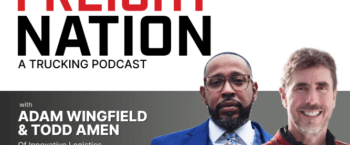Fraud & Scams: Don’t Be a Victim

Simplify Carrier Vetting
With Risk Factors
Identify high-risk carriers to protect your business from fraud
When you’re a business owner, saving on expenses is essential to maintaining a healthy and profitable business. As income fluctuates, there is additional emphasis on saving money, reducing expenses, and increasing profits. One way to avoid unexpected expenditures is by mitigating the potential of falling victim to one of the many fraudulent scams constantly taking place in the transportation industry.
Truckstop hears stories from people all the time who have fallen victim to a variety of different scams. These fraudulent activities include stolen identities, stolen freight, fuel advance scams, and much more. We also hear success stories from customers who have been able to avoid being victimized as a result of the tools we provide.
In general, it’s good to be aware of how different scams work, how they’re executed, and how you can avoid them and protect yourself.

Fuel Advances
One of the most common scams involves fuel advances. Scammers pose as legitimate carriers to book loads with unsuspecting brokers. The broker will be provided with a falsified bill of lading (BOL) as proof of a load pick-up that never happened in an attempt to secure a fraudulent fuel advance.
They can result in the identity theft of innocent carriers, as well as the loss of revenue for the brokers who are issuing fuel advances to scammers. To avoid the risk of being victimized, a lot of brokers have stopped issuing fuel advances when they don’t have a history of working with the carrier. Brokers are also issuing fuel advances in much smaller amounts to reduce the loss in the event of a scam.
Double Brokering
Double brokering is when someone accepts payment for freight that they didn’t work with a shipper to move. It happens when a broker assigns a load to another broker, sends the second broker money for moving the load, but the second broker never actually contracts with a driver to move it.
Cargo Theft
This can happen anywhere cargo happens to be – a truck stop, parking lot, loading dock, trailer lot, etc. It can be a crime of convenience or a well-plotted con. A criminal may show up at a loading dock impersonating a carrier and tell the dock manager they’re picking up a load early. Or they might show up to a trailer lot, hook up to a trailer, and drive out of the lot. Other times, a criminal will steal whatever they can from under a tarp or an open trailer.
Whether you’re a broker, carrier, shipper, freight-forwarder, or any combination thereof, Truckstop.com provides a variety of tools and resources designed to help keep your business safe and improve your overall bottom line.

If you’re a broker…
- If you’re signed up for Truckstop Pro, tools like the Carrier Performance Rating can help you protect yourself. It provides ratings, complaints and compliments, inspections and histories for carriers so you can make informed decisions. Good hiring decisions are critical to every business, and hiring reputable people into your organization will help your company prosper.
- Always read the contract. It’s easy to ignore the fine print, but it can hurt your business. Scammers will use a legitimate company’s business information to get a cash advance. If it looks like the paperwork has been messed with or altered by a third party, follow up with the company directly to confirm that the load exists and information is correct.
- If you’re worried about a load once it’s on the road, Cargo Insurance will protect you from theft, an unattended vehicle, “Act of God,” and more.
If you’re a carrier…
- Always work with vetted brokers. Truckstop vets all the brokers that use our Load Board every 90 days. You can also sort by credit scores and days-to-pay to ensure you’re working with reliable brokers.
- Work with factoring companies that offer a non-recourse factoring. Non-recourse factoring is a type of factoring that protects you if the broker billed fails to pay the submitted invoice. It means the carrier is guaranteed to get paid as long as they aren’t at fault for a failed payment due to incorrect paperwork or similar. (Learn more about non-recourse factoring.)
- Read every contract! Signing a contract without reading it can result in fees you have to pay and without any recourse to recoup lost expenses. Contract terms for detention, truck ordered not used, late deliveries, and lumper fees are some common examples. When a broker doesn’t state their contract terms, industry standards apply and are effectively enforced. On the other hand, when terms are clearly stated and accepted with a carrier’s signature, the contract terms must be honored. Reviewing a contract takes time, but it can save you money and provide a clear understanding of what’s expected by all parties.
- Never leave cargo unattended unless it’s completely secure. Use additional security features like rear door locks and always park in a secured lot.

These suggestions coupled with the using some of the other cost saving tools provided by Truckstop can be a broker’s and carrier’s best way to protect themselves, their business, and their bottom line. Tools such as Carrier Onboarding, Carrier Monitoring, Fuel Desk, and Rate Insights should be must haves in your business. They are products specifically designed to help you make business decisions and assure competitive rates, route optimization, and negotiation strength.
For more information about these and other tools provided by Truckstop.com, email [email protected], or give us a call at 1-800-203-2540.
If you have been a victim of identity theft or a scam, email our Security Department at [email protected].

Find out how our platform gives you the visibility you need to get more done.
Get helpful content delivered to your inbox.
Schedule a demo.
Find out how our platform gives you the visibility you need to get more done.





